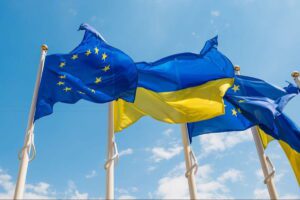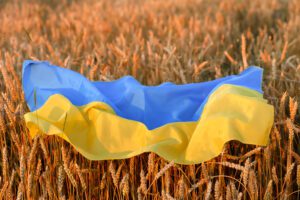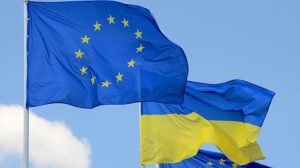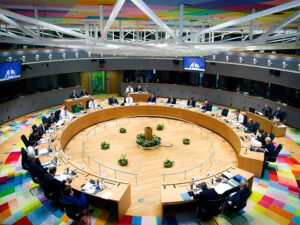
Regulation of the European Parliament and Council No. 2022/870 on temporary trade liberalization measures, exempting Ukrainian exports from duties for a year, came into force on Saturday, the Ministry of Economy reported.
“This decision complements the opportunities that our exporters have in accordance with the Association Agreement between Ukraine and the EU. Now the tariffs prescribed in the Agreement will be temporarily suspended,” the agency said.
It clarified that these were duties for industrial products; suspension of the application of the entry price system for fruits and vegetables and all tariff quotas for agricultural products; and the suspension of anti-dumping duties on imports of goods originating from Ukraine and the application of global safeguard measures in relation to Ukrainian goods.
In turn, the liberalization of trade relations implies that Ukraine will comply with European rules: the origin of goods and related procedures under the Association Agreement; refraining from any new restrictions on imports from the EU; Ukraine’s respect for democratic principles, human rights and fundamental freedoms, the rule of law, and the fight against corruption.
“These new rules will be in effect for a year and will help Ukrainian producers and exporters withstand the pressure of the war and strengthen their positions in the European market,” the Ministry of Economy stressed.
It indicated that the EU is now Ukraine’s largest trading partner. In 2021, the European Union accounted for 39% of the total trade volume of our state. The volume of trade increased by 35% and amounted to $62.5 billion.
Ukraine exports to the European Union, primarily ferrous metals, ores, electrical machines, oil and grain. “We expect that trade liberalization will help our exporters strengthen their positions in these and other commodity niches,” the Ministry of Economy added.

The sixth package of EU sanctions provides for a phase-out of Russian oil, in particular from 6 months for crude oil to 8 months for other refined products, the European Council reported.
“The EU has decided to ban the purchase, import or transfer of crude oil and certain petroleum products from Russia to the EU. The phase-out of Russian oil will take from 6 months for crude oil to 8 months for other refined products,” the European Council said in a press release on its website. on Friday.
A temporary exemption is provided for the import of crude oil by pipeline to those EU member states that, due to their geographical position, suffer from a special dependence on supplies from Russia and do not have viable alternatives.
“Moreover, Bulgaria and Croatia will also receive temporary derogations regarding the import of Russian marine oil and vacuum diesel fuel, respectively,” the European Council said.

The EU is working on the creation of solidarity lines for the export of grain from Ukraine, President of the European Commission Ursula von der Leyen has said.
She has said that 20 million tonnes of wheat are stuck in Ukraine and must be taken out. Therefore, they have created and are working hard on solidarity lines that will make it possible to take out batches of this wheat through land routes and trains to their ports. This is not trivial and, of course, more tiring and more expensive, but it is necessary to take this grain out, von der Leyen said at a press conference following the Special Meeting of the European Council in Brussels on Tuesday.

Prime Minister Denys Shmyhal says that Ukraine expects to join the common customs area with the European Union within a month.
“We are grateful for the provision by Slovakia of extremely needed military assistance and for humanitarian assistance, which covers almost all areas,” Shmyhal was quoted by the government press service as a result of a meeting in Kyiv with President of the Slovak Republic Zuzana Chaputova on Tuesday.
The Prime Minister noted that Ukraine expects to become a full member of the European family.
“Slovakia is one of the largest advocates of Ukraine in the European Union. We appreciate the initiative to unite with our friends to advance the granting of Ukraine the status of an EU candidate. We are grateful for such support,” he said.
The Prime Minister stressed that Ukraine has fulfilled more than 70% of the Association Agreement with the EU.
“We have an ambitious goal of joining the NCTS, the Common Customs Space, within a month. We are ready for all challenges and Denis Shmigal is ready.
Chaputova, for her part, noted that Slovakia had a recent experience of integration into the EU and her country would support Ukraine on this path.

The Council of the European Union (EU) has adopted a regulation allowing for temporary trade liberalisation and other trade concessions with regard to certain Ukrainian products.
“We proposed it as a temporary measure, and it will make it easier for Ukraine to continue trading in the face of Russia’s aggression and will provide overall support to the Ukrainian economy,” Executive Deputy Chairman of the European Commission Valdis Dombrovskis said, commenting on the decision adopted by the EU Council on Tuesday.
The decision will suspend tariffs, which are still in place under the 2017 the Association Agreement between the EU and Ukraine establishing a deep and comprehensive free trade area (DCFTA), which liberalized much of the trade.
The suspension covers notably: industrial products subject to duty phase out by the end of 2022, fruits and vegetables subject to the entry-price system, and agricultural products and processed agricultural products subject to tariff-rate quotas, the collection of anti-dumping duties on imports originating in Ukraine, and the application of the common rules for imports with respect of imports originating in Ukraine.
The European Commission’sproposal has already been approved by the European Parliament, the law will enter into force after publication in the Official Journal of the EU.
Dombrovskis also said that the ministers of economy and finance of the EU countries discussed the European Commission’s proposal for short-term relief and long-term reconstruction, and more specifically, our proposal for an exceptional macro-financial assistance programme of EUR 9 billion. He said that “there was broad – in fact unanimous – support for a continued need to provide necessary support to Ukraine to face this aggression.”

Prime Minister Denis Shmygal says that by the end of the year Ukraine plans to expand the capabilities of Ukrainian energy companies, and will be able to export to the European Union about 800 MW of electricity per day.
“In mid-March, Ukraine joined the European network ENTSO-E ahead of schedule… Ukraine is already exporting its electricity to Europe,” Shmygal told a government meeting on Tuesday.
According to the Prime Minister, in April, electricity exports to Poland increased by 35% compared to pre-war January.
“By the end of the year, we plan to expand the capabilities of Ukrainian energy companies, and will be able to export to the EU about 800 MW of electricity per day. This will help Europe to abandon the consumption of Russian coal and reduce the consumption of Russian gas, “he said.